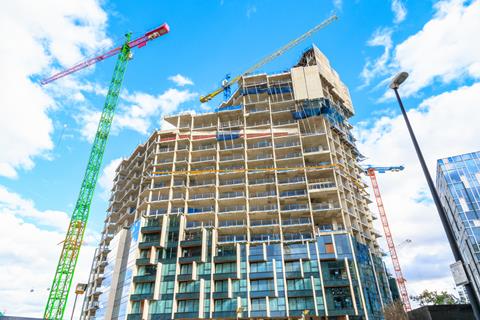New ‘super-regulator’ to be introduced from 2028 alongside tighter controls on construction products
The construction industry has welcomed the government’s response to the Grenfell Inquiry’s final report but warned of the potential for disruption if tighter regulatory controls are introduced too quickly.
A ‘super-regulator’ for the entire industry will be introduced from 2028 alongside a raft of other reforms including stricter regulation of construction products under measures announced by deputy prime minister Angela Rayner on Wednesday.
The changes, which also include a review of so-called ‘higher risk buildings’ and a licensing scheme for contractors, come after several years of adaptation for the industry following the rollout of the new Building Safety Regulator in October 2023.

Michael O’Connor, partner at Charles Russell Speechlys, said there would likely be a “tension” between the introduction of new regulation and the government’s ambition to build 1.5 million homes before the next parliament.
“Given the extent of the regulatory change considered necessary, it’s necessary to introduce these measures over a period of years, allowing the industry time to adopt new practices. However, this means that the industry could still be in a state of flux for years to come, with delays to the approval of remedial schemes and new higher risk buildings.”
> Also read: Single regulator to be introduced from 2028 as government sets out Grenfell Inquiry response
> Also read: Government sets out plans for reform of construction products regime
> Also read: Seven firms could be disbarred from taxpayer contracts over Grenfell failings
> Also read: The government’s response to the Grenfell Inquiry: Key proposals at a glance
He added that while the government’s intention to reform highlights a commitment to change, the “practicalities of implementation, market dynamics, and regulatory efficiency present significant challenges that the government must also address to ensure their overall ambitions for the sector”.
O’Connor also warned that plans to investigate seven firms criticised by the inquiry report, including product manufacturers Arconic, Kingspan and Saint Gobain, could lead to a reduction in competition within already constrained markets.
Trowers & Hamlins partner Douglas Rhodes said the prospect of further reforms after the implementation of the Building Safety Regulator, which has resulted in widespread delays to high-rise residential schemes, “will cause concern across the property industry that further delays and operational difficulties will be encountered”.
“It is to be hoped that the Government will focus its energies on ensuring that the new regulatory system operates properly – and that the Building Safety Regulator is properly resourced – before further reforms are implemented,” he said.
Andrew Parker, head of the construction disputes and building safety practices at law firm Forsters, said it was right for the government to accept the inquiry’s recommendations but cautioned that the industry was still getting to grips with the current regime.
“Too much radical change at this point would create further uncertainty and reduce productivity in the construction industry at a time when the Government is seeking to deliver on its growth ambitions.”
However, he said that the creation of a single construction regulator was long overdue and should be an effective way of reducing the complexity and fragmentation of the regulatory regime if introduced carefully and in consultation with the industry.
And Andrew Mellor, partner at PRP and technical advisor to the Ministry of Housing, Communities and Local Government and the Welsh Government on regulations and building safety, said the proposed timescales of the reforms appeared realistic.
“The proposed implementation plan over a three year period appears to be realistic, and the focus on the existing improvement commitments is very sensible given the existing immediate capacity of the industry and regulators to take on more regulatory change,” he said.
Mellor said any new regulator would need more resources than the current regime, while the government would need to allow time for recruitment in order to enable the new body to prevent the delays that many are currently experiencing.
Gary Strong, head of professional building practices at the Royal Institution of Chartered Surveyors, welcomed the government’s approach and described the reforms as “crucial”.
“A new, dedicated construction sector regulator and chief construction adviser is welcome, and RICS will continue to offer its expertise to the government to support plans for the new regulator as it takes shape.
“New rules on product safety should further raise manufacturing standards, whilst new laws empowering tenants in the social housing sector will help protect some of the most vulnerable.
“It is reassuring that the government plans to provide updates every quarter and RICS will support the implementation of these reforms every step of the way.”
Caroline Gumble, chief executive at the Chartered Institute of Building (CIOB), added: “We very much welcome the Government’s response to the Grenfell Tower Inquiry Phase 2 Report, which will provide the construction industry with much-needed clarity and guidance on the actions that must be taken to reduce the risk of such a tragedy happening again.
“We recognise there is a significant amount of work to do and the introduction of the Building Safety Act 2022, while a positive step, was only the beginning.”
















No comments yet